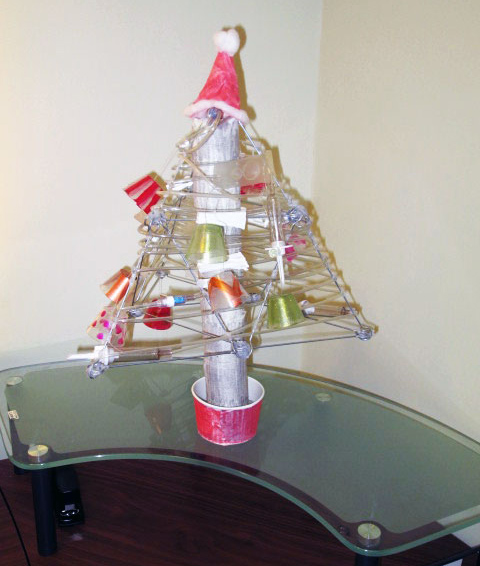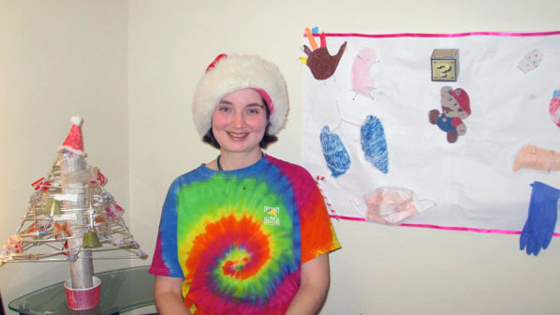
A unique Christmas tree by former patient Jessica Bailey keeps the Spiritual Care office at TGH festive. (Photo: UHN)
Made from intravenous (IV) tubes, wires from used IV bags, denture cups, toilet paper rolls and fishing wire, this Christmas tree is no ordinary tree.
It took a few weeks to collect all the supplies to make the tree, remembers former TGH patient Jessica Bailey. She spent most of 2013 within the four walls of a hospital room, with regular trips to her chemotherapy appointments.
"I had some time on my hands," the 30-year-old recalls with a smile.
Related to this story:
For Bailey, making the tree and other artwork was a way to express her creativity while receiving treatment. Some of her creations – including the tree - now sit in a Spiritual Care office in TGH. They are a tribute to a department that helped her while she spent many holidays in the hospital.
"I could talk to them about anything," she says.
Holidays with Spiritual Care
Bailey is one of many patients who have sought out Spiritual Care over the holiday season. December – whether a patient celebrates the winter holidays or not – can often be a sensitive time in the hospital, says Bob Hunt, a Spiritual Care practitioner who works mainly at Princess Margaret Cancer Centre.
"Many patients experience the energy around Christmas because people are up and there are decorations, family get-togethers and parties," he says. "While it may not have any religious, historical or cultural meaning or significance to them, to find themselves in hospital can still be hard."
Spiritual Care providers work with patients, families and staff at UHN to help them through crises or critical transitions in their lives. Through conversations, Spiritual Care offers a support system in the form of drop-in sessions, one-on-one counselling and group activities.
While Hunt has noticed a bit of a peak in requests for Spiritual Care in the lead-up to the December festivities, he sees such meetings as an opportunity to offer guidance around other elements of hospital life.
"Often counselling around the holidays offers an entry into a deeper sort of conversation around feelings of loss, sometimes abandonment, anger, sadness, fear, isolation from community and family," he says. "It's more around engaging the feelings that people have because they find themselves in hospital at a particularly significant time."
For the most part, those who seek support around the holiday season do tend to be religious patients – which is only one subgroup that Spiritual Care providers see on a daily basis, Hunt says.

Jessica Bailey poses with the art she created for Spiritual Care. (Photo: UHN)
Spirituality vs. Religion
"We're here for everybody; you don't need be religious or overtly spiritual," says Linda Kuschnik, a Spiritual Care provider at TGH.
"Our spirituality is connected to family, culture and much more," she explains. "It may have many ways of expressing itself. It is how we make sense and understand ourselves in the world."
Hunt often likens his work in Spiritual Care to that of a belayer – someone who holds the rope for mountain climbers to make sure they don't fall.
"I hold the other end of the rope and I can stand back and see the face of what it is (patients) are climbing and offer encouragement and support.
"It's not about me pulling somebody up a mountain or telling him or her which route they have to take," he says. For Hunt and Kuschnik, spiritual care and healing is about providing a listening ear and a supportive space to express one's spirituality.
Spiritual Care is an outlet for expression
"People feed their spirituality in lots of different ways – photography, painting, writing, poetry, blogging," Hunt says. And sometimes, says Kuschnik, people feed their spirituality by making Christmas trees and symbols of what they value -- much like Bailey.
"The Christmas tree was very much a creative expression of hope and renewal for Jessica Bailey," Kuschnik explains.
Bailey has been out of the hospital for nearly a year. The chemotherapy treatment was successful, and she is back to doing some of her favourite activities – like yo-yoing. She looks back on her time spent with Spiritual Care as a constructive point in her journey.
"I want everyone to know that Spiritual Care is there for anyone. You don't have to talk about religion – I rarely did. They find you someone who you can talk to no matter what."
